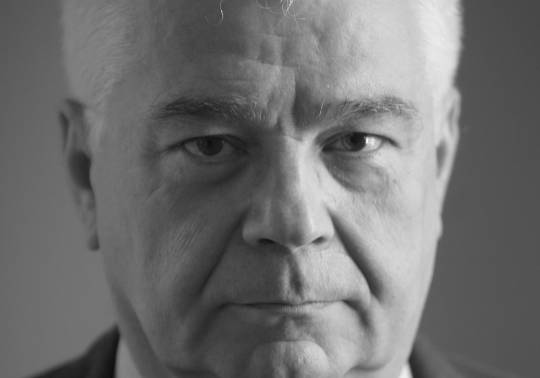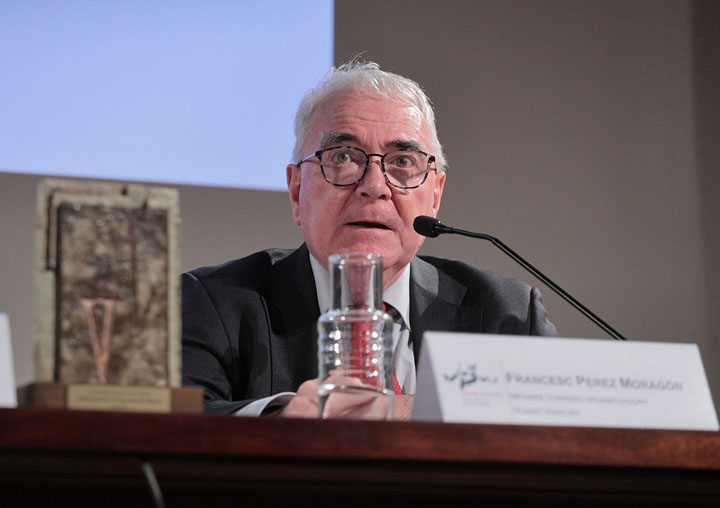Jordi Palafox presents his essay about the economic future of Spain in La Nau
- Office of the Vice-Principal for Culture and Society
- October 3rd, 2017

Jordi Palafox, full university professor of History and Economic Institutions of the Universitat de València presents his book ‘ Cuatro vientos en contra: el porvenir económico de España’ (Pasado & Presente, 2017) Wednesday 4th October at the Cultural Centre La Nau of the Universitat de València. The event will take place at 19:00 at the Aula Magna and is framed within the activities of the Escola Europea de Pensament Lluís Vives of the Office of the Vice-Principal for Culture and Equality.
The presentation of the book counts on the intervention of Antonio Ariño, vice-principal for Culture and Equality of the Universitat de València and the full university professors Matilde Mas and Carlos Sebastián.
After his retirement, Jordi Palafox has written a book for ‘non-specialists’ in which he analyses the challenges of the economic future of Spain. He defines these challenges as the ‘four headwinds’ (cuatro vientos en contra), referred in the title of his book. The main adversities are the emergence of China as a new world power; the transformations in the ways of producing and trading linked to the so-called Global Value Chains; gaps in the skills and qualifications of the population; and finally the institutions of economic activity in Spain.
The book promotes a comparative view, placing the Spanish case in the international context and with abundant references to economic powers such as China or the United States, in order to find a path of economic viability that will lead to an improvement in the standard of living of everybody.
From this essay, the historian and doctor ‘honoris causa’ by the Universitat, Josep Fontana, points out that it constitutes ‘an objective analysis of the current situation of the Spanish economy, starting from the denunciation of the errors that have led us to this point, give this book the necessary degree of 'pessimism of the intelligence', to put it in the terms used by Gramsci, balanced by an optimism that is born of the confidence that the Spaniards will be able to take the road that leads to overcome the mistakes of the past and the difficulties of the present’.
Jordi Palafox is doctor in Economics and full university professor of History and Economic Institutions of the Universitat de València until his early retirement last August 2014. He has also been visiting professor at several prestigious universities such as Berkeley or Rosklide (Dennmark). First director of the UIMP in València; researcher del Valencian Institute of Economical Investigations (IVIE) where he has written several monographies and member of the Editorial Board of the journal ‘Revista de Historia Económica’. He was member of the Management Board of Bancaja from 1998 to 2006 when he resigned. He is author of several books about contemporary economic history of Spain as well as some monographies about the human capital stock in Spain. He has also been awarded with the essay prize Joan Fuster in 1975.
The Escola Europea de Pensament Lluís Vives
The event takes place within the Escola Europea de Pensament Lluís Vives, a cultural project fostered by the Office of the Vice-Principal for Culture and Equality and managed by the General Foundation of the Universitat de València. It is framed as a space for reflecting and open debating, participative and critical not only about the global current affairs but also about the Valencian society.
The Escola also counts on the participation of other individuals of the Public administration and civil society: The President of the Valencian government, the City Hall of Valencia, the Valencian Department of Transparency and Education, Research, Culture and Sports, the Acadèmia Valenciana de la Llengua, the Alfons el Magnànim Institute, the Escola Europea d’Humanitats and the Caixa Popular.
File in: Cultura , Conferències i debats , Escola Europea de Pensament Lluís Vives , Fundació General UV
















